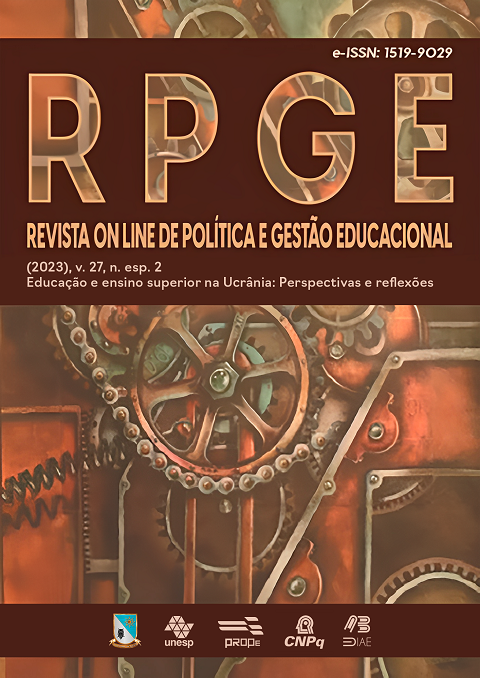Ensino a distância 2023
Tendências, desafios, problemas
DOI:
https://doi.org/10.22633/rpge.v27iesp.2.18583Palavras-chave:
Educação moderna, Educação digital, Ferramentas de ensino a distância, Treinamento profissional, Ensino superiorResumo
O presente artigo proporciona uma análise abrangente das pesquisas mais recentes no domínio da educação a distância, abordando os elementos cruciais das tendências, desafios e questões associadas ao ensino remoto. Destacam-se o papel e a relevância das tecnologias contemporâneas no aprimoramento da qualidade do ensino remoto. A metodologia empregada envolve a análise de pesquisas científicas. Com base na revisão da literatura, são examinadas as inovações tecnológicas voltadas para o aperfeiçoamento do processo de aprendizado. Ademais, ressalta-se a importância da interação dinâmica entre professores e alunos no contexto virtual. As conclusões destacam a imperatividade de futuras pesquisas com vistas ao aperfeiçoamento contínuo da educação a distância e do processo de aprendizado. A análise deste artigo oferece um discernimento profundo sobre os desafios contemporâneos e as perspectivas relativas ao avanço da educação à distância.
Downloads
Referências
ADANAN, H.; ADANAN, M.; HERAWAN, T. M-WebQuest Development: Reading Comprehension of Senior High School Students in Indonesia. International Journal of Emerging Technologies in Learning (iJET), v. 15, n. 03, p. 74, 18 Feb. 2020. DOI: 10.3991/ijet.v15i03.10628.
ALMAZOVA, N.; BARINOVA, D.; IPATOV, O. Forming of information culture with tools of electronic didactic materials. In: ALMAZOVA, N.; BARINOVA, D.; IPATOV, O. INTERNATIONAL DAAAM SYMPOSIUM, 28., 2018. Proceedings […]. [S. l.]: DAAAM International Vienna, 2018. p. 0587-0593. DOI: 10.2507/29th.daaam.proceedings.085.
ARTHUR-NYARKO, E.; AGYEI, D. D.; ARMAH, J. K. Digitizing distance learning materials: Measuring students’ readiness and intended challenges. Education and Information Technologies, v. 25, n. 4, p. 2987-3002, 15 Jan. 2020. DOI: 10.1007/s10639-019-10060-y.
BAGUZINA, E. Webquests: Fostering Foreign Language Learning in a University Environment. SSRN Electronic Journal, 2020. DOI: 10.2139/ssrn.3552707.
BAKER, D. Mc A.; UNNI, R. USA and Asia Hospitality & Tourism Students' Perceptions and Satisfaction with Online Learning versus Traditional Face-to-Face Instruction. E-Journal of Business Education and Scholarship of Teaching, v.12, n. 2, p. 40-54, 2018.
BRAUN, V.; CLARKE, V. Reflecting on reflexive thematic analysis. Qualitative Research in Sport, Exercise and Health, v. 11, n. 4, p. 589-597, 13 June 2019. DOI: 10.1080/2159676x.2019.1628806.
DANDASHLY, N. A.; BARBAR, A.; ANTOUN, M. The effects of using blogs and webquests in teaching education postgraduate courses. Global Journal of Information Technology: Emerging Technologies, vol. 9, no. 1, p. 12-19, 30 Apr. 2019. DOI: 10.18844/gjit.v9i1.4018.
GÜRGIL, F.; ÜNAL, M.; AKSOY, B. Social Studies Preservice Teachers’ Views on and Experiences with WebQuest. Journal of Education and Training Studies, vol. 7, no. 4, p. 131, 14 Mar. 2019. DOI: 10.11114/jets.v7i4.4061.
HALBERSTADT, J. et al. Skills and knowledge management in higher education: how service learning can contribute to social entrepreneurial competence development. Journal of Knowledge Management, v. 23, n. 10, p. 1925-1948, 9 Dec. 2019. DOI: 10.1108/jkm-12-2018-0744.
KONONETS, N.; ILCHENKO, O.; MOKLIAK, V. Future teachers resource-based learning system: Experience of higher education institutions in Poltava City, Ukraine. Turkish Online Journal of Distance Education, p. 199-220, 1 July 2020. DOI: 10.17718/tojde.762054.
KOSTENKO, L. et al. Distance learning as an integrative response to contemporary challenges. Futurity Education, v. 3, n. 1, p. 151-164, 24 Mar. 2023. DOI: 10.57125/fed/2022.10.11.12.
KULICHENKO, A.; POLYEZHAYEV, Y. Innovative information and communication technologies for ergotherapists applied during english learning in Ukraine. AD ALTA: 10/02, v. 10, n. 2, p. 228-233, 31 Dec. 2020. DOI: 10.33543/1002228233.
LIU, Q.; CHEN, H.; CRABBE, M. J. C. Interactive Study of Multimedia and Virtual Technology in Art Education. International Journal of Emerging Technologies in Learning (iJET), v. 16, n. 01, p. 80, 12 Jan. 2021. DOI: 10.3991/ijet.v16i01.18227.
LUTSENKO, N. S.; SIDELNIK, E. A.; MELNIK, O. G. Webquest in teaching students. In: ALMAZOVA, N. I.; RUBTSOVA, A. V.; BYLIEVA, D. S. (ed.). Professional Сulture of the Specialist of the Future. European Proceedings of Social and Behavioural Sciences. London: Future Academy, 2019. v. 73, p. 618-629. DOI: 10.15405/epsbs.2019.12.66.
PARK, H. H.; FAERMAN, S. Becoming a Manager: Learning the Importance of Emotional and Social Competence in Managerial Transitions. The American Review of Public Administration, v. 49, n. 1, p. 98-115, 3 July 2018. DOI: 10.1177/0275074018785448.
PEARLSTEIN, J. Team formation that models real life: Teaching students to form better teams in the capstone and beyond. Journal of Education for Business, v. 95, n. 6, p. 375-383, 8 Oct. 2019. DOI: 10.1080/08832323.2019.1665488.
PROKOPENKO, O. Technological challenges of our time in the digitalization of the education of the future. Futurity Education, v. 1, n. 2, p. 4-13, 25 Dec. 2021. DOI: 10.57125/fed/2022.10.11.14.
SHERMAN, M. et al. The future of distance education in war or the education of the future (the Ukrainian case study). Futurity Education, v. 2, n. 3, p. 13-22, 25 Sept. 2022. DOI: 10.57125/fed/2022.10.11.30.
TYTOVA, N; MERENIUK, K. Digital literacy of future teachers in the realities of large-scale military aggression (Ukrainian experience). Futurity Education, v. 2, n. 3, p. 43-54, 25 Sept. 2022. DOI: 10.57125/fed/2022.10.11.33.
ZINCHENKO, V.; OSTAPENKO, S.; UDOVICHENKO, H. Introduction of Academic Honesty as a Necessary Prerequisite and an Important Component of Quality Education for Future Economists. Revista Romaneasca pentru Educatie Multidimensionala, vol. 13, no. 1, p. 81-95, 16 Mar. 2021. DOI: 10.18662/rrem/13.1/361.
Publicado
Como Citar
Edição
Seção
Licença
Copyright (c) 2023 Revista on line de Política e Gestão Educacional

Este trabalho está licenciado sob uma licença Creative Commons Attribution-NonCommercial-ShareAlike 4.0 International License.
Manuscritos aceitos e publicados são de propriedade da Revista on line de Política e Gestão Educacional. É vedada a submissão integral ou parcial do manuscrito a qualquer outro periódico. A responsabilidade do conteúdo dos artigos é exclusiva dos autores. É vedada a tradução para outro idioma sem a autorização escrita do Editor ouvida a Comissão Editorial Científica.











